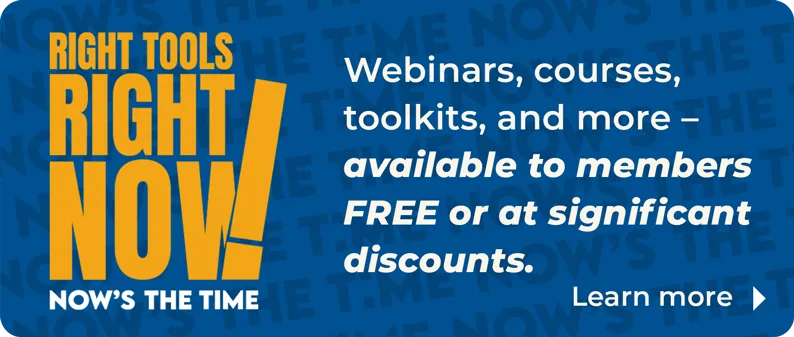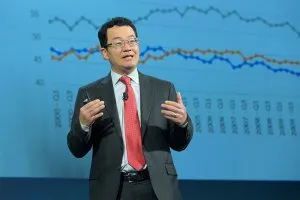by Carolyn Schwaar
When Marti Wermager was handed the keys to the Lakes Country Association of Realtors® office, she’ll admit, she was clueless. “The board said it’s a kinda quiet little office, and that I’ll just ‘figure things out,’ ” Wermager says. But she soon found that even her background as a paralegal couldn’t have prepared her for the complexities of association bylaws, MLS rules, and dues record-keeping.
After just a few weeks on the job, she began wondering what she had gotten herself into. Then three neighboring AEs came to her rescue, reaching out to share their expertise. “Had they not reached out to me, there is no way I could have learned my job,” reflects Wermager.
Association executives recognize the value of sharing the tips and tricks that have helped make them successful. Veteran executives across the country serve as mentors to a host of younger and less experienced association leaders as a way to strengthen the AE community. This relationship can involve answering sometimes-frantic phone calls and responding to questions via e-mail, but most often it’s just about listening and swapping stories.
Listen to the voice of experience
For two years, 20-year veteran Jeanette Newton, CEO of the Dulles Area Association of Realtors®, Va., has guided Winsome Earle Sears, CEO of the Blue Ridge Association of Realtors®, Va., helping her understand the quirks of association management and Realtors® .
Like Wermager’s, Sears’ background more than qualified her for the association’s chief position. As a state legislator, she served her constituents tirelessly, helped pass a $60 billion budget, sat on committees, and negotiated legislation. Sears soon found out, though, that there’s no substitute for actual on-the-job experience. “There were so many intricate things that I couldn’t have known [about this job] or that would have taken years to learn,” she says.
For example, Newton showed Sears that she could always tweak an existing form or policy from another association to fit her needs.
“Jeanette would say to me, ‘Oh, calm down, it’s not as bad as you think it is,’ ” Sears laughs. “She talked me through how boards work, how bylaws work, and most important, how Realtors® think.”
Lend a hand
“Whenever a local board hires a new AE, we ‘older’ AEs offer our help,” says Beverlee C. Beers, executive officer of the Hancock-Washington Board of Realtors®, Maine. “We all help each other out and e-mail the others whenever one of us has a question or needs information about CE courses, forms, NAR, NRDS—anything that comes up in association management.”
“It’s too small of a world to not help everyone out,” echoes Ryan J. Tucholski, rce, of Lakeland Association of Realtors®, Fla. Tucholski, just 26 years old, counts among his professional mentors veteran AEs Doris Nurenberg, rce, CEO of the Huntsville Area Association of Realtors®, Ala., and recently retired Judith Lindenau, of the Travers Area Association of Realtors®, Mich.
“I met Judith and then just started calling her with questions,” says Tucholski. “I lean on people who’ve been in this business for 20 or 30 years, because they have the knowledge and I want it directly from the source.”
Pay it forward
Young AEs who succeed thanks to great mentors are likely to become great mentors themselves.
Take Carol S. Van Gorp, rce, cae, CEO of the Columbia Board of Realtors®, Mo., for example. She was the vice president of finance and information services at the Realtor® Association of Greater Miami and the Beaches and attributes much of her career success to the guidance of Teresa King Kinney, rce, cips, Miami’s CEO.
“She helped me learn about the Realtors® family, and then when the CEO position became available in Columbia, she coached me and helped me through the entire job search process, including reviewing my résumé and structuring answers to interview questions.”
Van Gorp now follows Kinney’s example by mentoring her staff to become experts in their field and helping them advance in the Realtors® organization, even if at another association.
“About a year ago, when the education director position became available in St. Louis, I called Jack Goldman [St. Louis’ CEO] and said he had to interview my education director, Tessa Hultz, because she was so fabulous. I worked on Tessa’s résumé and prepared her for the interview just like Teresa had done for me.” Hultz is now the senior vice president of education for the St. Louis Association of Realtors®.
Make the connection
The uniqueness of Realtors® association management and of Realtors® makes the job of a novice AE especially challenging without guidance from an experienced AE. The National Association of Realtors0®’ AE and Leadership Development department offers an online guide for new AEs, with stories and advice from veterans. Access the guide at www.nar.realtor/realtorae.nsf/pages/bootcamphome. n
You can be a mentor
What makes AE Jeanette Newton a great mentor? According to AE Winsome Earle Sears, it’s that “she’s not afraid to say what’s on her mind, she always takes my calls, and always returns my e-mails. She would just say, ‘I’ll be there for you and I won’t think any of your questions are stupid.’ ”
In fact, being a great mentor requires a sincere interest in someone else’s growth. There’s no reward except the satisfaction of sharing your experience to help others and strengthening the AE community.
What Mentors Do
l Share critical knowledge
l Explain how the industry works
l Offer challenging ideas
l Make themselves accessible
l Keep everything confidential
l Help build self-confidence
l Encourage professional behavior
l Teach by example and share experiences
l Provide growth opportunities
l Help in critical situations
l Offer encouragement
Adapted from the state of California Resources Agency.
16 Steps to finding a Life-changing mentor
Whether it’s your state AE, a neighboring AE, another business leader in your community, or someone you find online, experienced professionals are typically thrilled to be asked to share their advice. Here are some tips on securing a mentor and ensuring a long and mutually beneficial relationship.
1. Define a list of your top goals for the mentoring relationship.
2. Brainstorm a list of prospective mentors.
3. Research available information about them.
4. Select the top candidates who align with your goals.
5. Write a letter or e-mail to the mentor prospect requesting a meeting. You do not have to divulge at this time that you are interested in a longer-term relationship with them, just that you are interested in getting their input on what you are doing.
6. Call to set an appointment.
7. Prepare a short list of questions regarding their feedback on your current situation.
8. Meet with them. If they’re willing to take time away from their office, that’s best. You pick up the tab.
9. Ask them about their history, current situation, and goals.
10. State your goals and ask your questions. Take notes!
11. If you like their responses, you can test the waters with them regarding an ongoing relationship, e.g., “I really appreciate your input on this, and I’d greatly value it on an ongoing basis. Would you be willing to meet with me again next month to follow up on what we’ve discussed today?”
12. Send a thank-you note and perhaps a gift.
13. Review your notes.
14. Take action on their suggestions.
15. Call to discuss the results of those actions and request a second appointment (assuming you’re still interested).
16. Propose a mentoring relationship. Be sure to spell out your goals and expectations, as well as your commitment to them. A written agreement will show you are serious about the commitment.
Keep in mind that although a mentoring relationship generally lasts more than just one
or two meetings, neither of you is locked in. The relationship lasts as long as it continues
to serve you both well.
Adapted from “Choosing a Business Mentor (and Getting Them to Choose You),” by Scott Allen,
online at entrepreneurs.about.com








